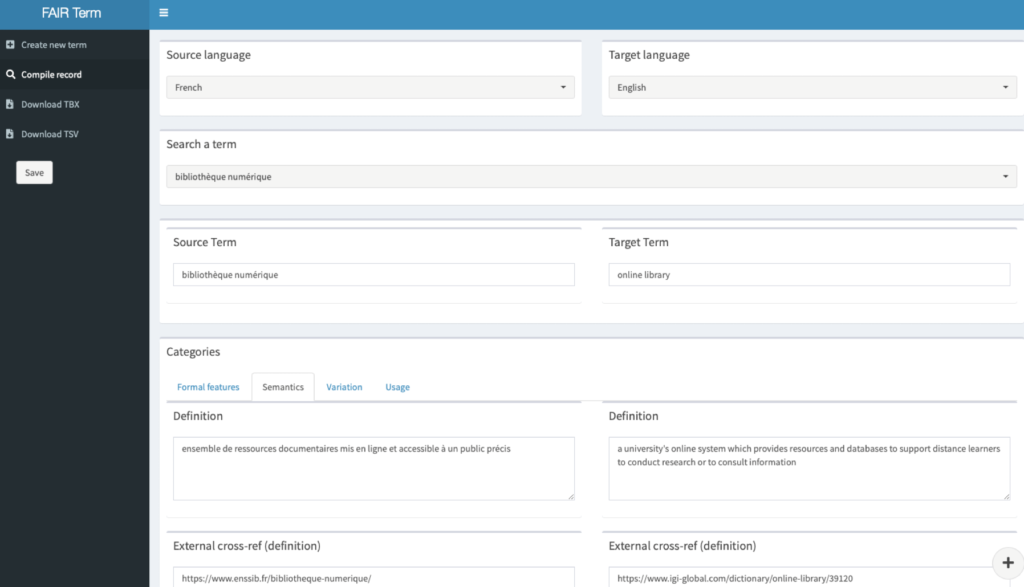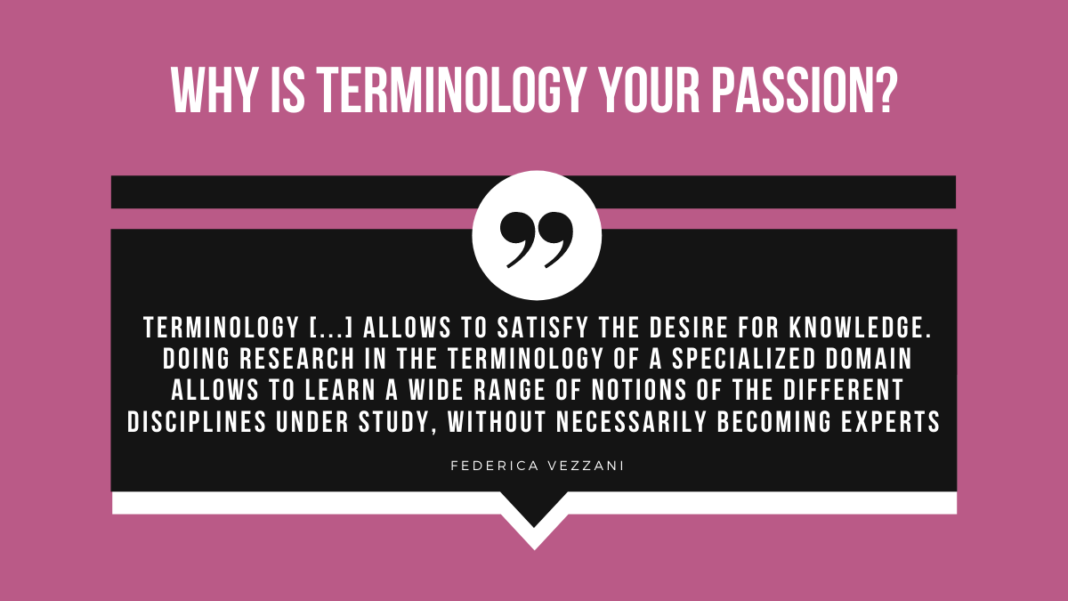
Federica Vezzani is assistant professor – RTDa (non-tenured) – in French language and translation at the Department of Linguistics and Literary Studies of the University of Padua. In 2020, she obtained the title of PhD (Doctor Europaeus) in terminology, terminography and specialized translation with a thesis on the design and implementation of the TriMED multilingual terminological database for the medical domain. Her main research interests focus on the management of multilingual terminological data and metadata according to ISO standard for terminology, and she has developed the “FAIR terminology” paradigm for the optimal organization of findable, accessible, interoperable and reusable terminological data in line with the principles promoted in the framework of the European Open Science Cloud. She is a member of the steering committee of the project “Terminology without Borders” promoted by the Terminology Coordination Unit of the European Parliament and member of the Technical Terminology Committee of the national Association for technical communication COM&TEC.
When did you discover that Terminology was your passion, and how did it become the focus of your academic and professional career path?
Ever since I was a child, I have always thought of language as the most powerful way to express one’s own opinion and stand up for one’s own reasons. Expressing thoughts and knowledge in a clear way is an aspect that has always been particularly dear to me. A clear communication certainly benefits both those who express the message and those who receive it. Terminology, in a sense, represents for me the mindset to achieve the objective of clear communication, which becomes fundamental when we are dealing with the transmission of specialized knowledge.
Another great advantage that I find in the discipline of Terminology is the fact that it allows to satisfy the desire for knowledge. Doing research in the terminology of a specialized domain allows to learn a wide range of notions of the different disciplines under study, without necessarily becoming experts. This, in my opinion, is one of the most satisfying aspects of Terminology as a research tool and method.
For all these reasons, having undertaken a professional path in Terminology is the natural continuation that allows me to keep on in deepening these problems from an academic research viewpoint and to transmit (I hope!) this passion to students who choose the university career.
In addition to being an academic researcher and teacher, you are also a professional specialised translator. How do you manage these three occupations? Is there a common thread that links them all?
Before starting my PhD in multilingual terminology at the University of Padua, I worked as an in-house translator at a translation agency that mainly dealt with legal texts for the Court of Padua. Later, I occasionally continued to take on some translation assignments as a freelance translator. This experience was fundamental for me to touch the tangible needs of professional translators: very often the main need was to have available and to be able to reuse, in the shortest possible time, the accurate terminology of the specialized domain for which I was working.
Hence the idea of deepening, from the academic research viewpoint, the problem of how to optimally structure terminological data and metadata within multilingual databases that need to be used by language professionals in the broad sense (translators, interpreters, technical writers, etc.). This led to the design and implementation of two multilingual terminological databases: TriMED for the medical domain in order to meet the information needs of patients, translators and physicians; and CAMEO (CommerciAl terMinology rEsOurce) for the terminology relating to the most exported products of the Veneto region, mainly aimed at supporting those who deal with the description of the product (technical communicators) and those who contribute to its internationalization (specialized translators).
As far as the specialized translation teaching, I strongly believe that the opportunity to have experienced firsthand – albeit for a relatively limited period – the needs of this category of professionals, constitutes for me an enormous advantage in the approach I adopt to teaching that aims to be extremely concrete and professionalizing.
So, to answer your question “Is there a common thread that links them all?”: of course, Terminology represents the fil rouge for these three activities. It is, at the same time, the method underlying teaching, the tool for carrying out the profession, and the object of scientific research.
Not all linguistic experts know how important Terminology is in the Translation field; some of them even consider it a waste of time in the translation process. To what extent do you think that Terminology affects the quality of a translation, and, therefore, why do you believe that a specialized translator should be involved and interested in Terminology?
In a 2003 paper published in the Journal Panace@ [4(12), p. 143-152], Professor Maurice Rouleau of UQTR – Université du Québec à Trois-Rivières – (Canada) states: “Se demander si la terminologie est au centre de l’activité langagière du traducteur spécialisé, c’est comme se demander si un être vivant respire. La question ne se pose pas ; la terminologie fait partie de sa vie professionnelle. La qualité de son travail dépend même en grande partie de sa compétence à faire une bonne recherche terminologique.”
I fully share this thought. Indeed, I set up my specialized translation course here at the University of Padua in this perspective. Terminological research allows, firstly, to decode the specialized information contained in the source text (a necessary step if we agree that it is not possible to translate what is not understood) and, secondly, to transcode it into the target language to convey in a precise and clear way the message to be transmitted.
I am strongly convinced that Terminology is therefore essential for the work of the specialized translator. On the other hand – again by virtue of my previous little experience – I am also perfectly aware that a translator does not have all the time at her/his disposal to conduct in-depth terminological research if s/he wants to remain competitive and up to date considering the ever-binding market needs. Here comes the work of the professional terminologist/terminographer who provides the tools, such as collections of multilingual terminological data, for use and consumption of specialized translators.
We all know that there are several software that help the terminological extraction and analysis, and you also have great experience with these tools. Which ones would you consider the best and to what extent do you think machines are reliable and useful for the terminologist’s and the translator’s work?
In my experience, the tools that I find best performing in terms of terminological extraction and analysis are Sketch Engine and TermoStat. The first one, although designed to manage both general and specialized language corpora, offers a wide range of functions (Key word and term extraction, Word Sketch, Thesaurus, etc.) that allow to obtain potentially relevant data for terminological analysis. The second one is instead conceived in the specific context of the terminological activity, and I find that for my working languages (French, English and Italian) it is highly performing.
In my opinion, a terminologist of the current digital age cannot disregard the use of these (and other) tools. Knowing how to juggle these applications and taking advantage of the data obtained from them constitute, to date, an integral part of the terminological work itself. Of course, the skill of the terminologist lies in the ability to interpret these data, so that they do not remain “sterile” information but rather the means to conduct conceptual and/or linguistic reflections of the domain under study.
You are one of the two developers of a new digital terminological analysis application, called FAIRterm, that the TermCoord has decided to adopt as the main software for the compilation of records within the Terminology without borders project. How did you come up with this idea? Can you describe the process that led you to the creation of FAIRterm?
FAIRterm is a free Web Application for the compilation of multilingual terminological records.
Together with Prof. Di Nunzio of the Department of Information Engineering of the University of Padua, we came up with the development of this tool following a series of reflections on how to optimally organize and visualize terminological (meta) data produced in the research, teaching, and corporate contexts.
The main idea is based on the “FAIR terminology” paradigm that I developed during my PhD. This paradigm gathers a series of guidelines to model and structure terminological (meta) data and resources in order to meet the principles of Findability, Accessibility, Interoperability and Reusability proposed by Wilkinson et al. (2016) and promoted within the framework of the European initiative for Open Science.
Indeed, “FAIR terminology” is an adaptation of these principles to the discipline and practice of Terminology. The paradigm is based on the adoption of the recommendations provided in the most recent ISO TC/37 SC/3 standards about the management of terminological resources, and aims to guide the design and implementation of a resource which:
- follows an interoperable structural model (Terminological Markup Framework)
- allows access to terminological data through standard communication protocols
- provides (meta) data rigorously documented, and therefore findable, through a data categories repository
- ensures data reuse through the application of terminology exchange formats (TermBase eXchange)
Starting from these prerequisites, we have developed the FAIRterm application which allows not only to have structurally standardized data, but also to visualize them in a more user-friendly way.
We are deeply grateful that TermCoord first supported us and believed in this project to the point of integrating the application as a working tool for YourTerm projects: we are confident that this opportunity will allow us to improve and refine the tool to make it more and more performing.
Could you give us a few examples of how FAIRterm works and could you describe some features it provides the user with? What are the main innovative aspects of this application and why did you consider it an important resource for terminologists and translators (e.g. you think that the other existing tools are incomplete or difficult to use etc.)?
The FAIRterm terminological record model provides about 20 data categories that have been agreed within the Steering Committee specifically for the Terminology Without Borders project. From a visualization viewpoint, these categories are organized into four panels relating to formal characteristics, semantics, variation, usage of the term being analyzed and its equivalent in the target language. Some of these categories are mandatory, such as the definition of the term contained in the semantics section, while others are optional, such as the orthographic variant contained in the section related to variation. In addition, some data categories, such as part of speech, have some predefined values that the user can choose from with pick list menus, while other categories are free text fields (such as notes or context of use of the term).
As shown in the screenshot, the record visualization is bilingual: the user has the same data categories to fill in for the source term (left) and for the target term (right). In the full spirit of multilingualism, the languages supported by the Web application and for which it is possible to fill in the records are the 24 official EU languages, plus Turkish, Russian, Chinese, Japanese and Korean. These are in short some of the most important features of the Web application.
In my opinion, the first advantage that this tool offers is the possibility to choose the working mode (individual or collaborative). Indeed, users can choose between 1) access the individual interface that allows to enter, modify, and consult only their own terminological data, or 2) access the collaborative interface that allows multiple users to work on the same record at the same time. This last functionality has been added thanks to the precious collaboration of Prof. Pascale Elbaz of the ISIT of Paris and of Prof. Elpida Loupaki of the Aristotle University of Thessaloniki and their respective groups of students, who worked collaboratively within the framework of the YourTerm TECH subproject. In this context, the students lent themselves to test the collaborative version of the application and their feedback was extremely useful to solve any problems that arose.
The second advantage offered is the possibility to reuse terminological data. As shown in the screenshot, the records can be downloaded both in tabular format (TSV) and in standard TBX format. This means that these data can be reused, for example, in different CAT tools. The advantage of having, on the one hand, structured data (TSV format) and, on the other, standardized data (TBX format), allows for making this information machine reusable.
Finally, the visualization is another important advantage of the FAIRterm application. I have been working with Excel files for a few years and I must admit that my eyes were starting to suffer. In this sense, FAIRterm allows a more convivial visualization even if some aspects certainly need to be further improved.

Speaking of terminology tools, IATE (InterActive Terminology for Europe) is the European Union’s terminology database, and it is managed and implemented by the European Parliament. What do you think of its importance and functionality, both in relation to Terminology and to Computer Assisted Translation tools?
IATE has been and will always be a reference point for Terminology researchers and language professionals. I believe that it represents, from a linguistic point of view, one of the most ambitious and complete services that the European Union (freely!) offers to its citizens.
As a professional translator, I positively experienced the effort that the IATE Management Group put in the redesign of the web application in 2018. The user experience has significantly improved both from the user interface and the functionality viewpoints: a better and easier interface together with the search and filtering functionalities make the work of the translator much faster and effective.
As a researcher in FAIR terminology, I think that the interoperability advances of IATE, makes it possible for us (researchers) to have a wider perspective of the impact that the terminological resources we implement can have on the real world. I believe that some of the requirements of the IATE database, such as the effort in the updates of the standardization format, the availability of the data (both as a whole TBX dataset and as an API to access the data), must be a part of our daily research.
You have been collaborating with the European Parliament through the participation in several Terminology without Borders subprojects. How did this cooperation develop and why do you believe it is an important and useful resource?
The collaboration with TermCoord started in 2019 and the first project I participated in was YourTerm MED as, at that time, I was working on my doctoral thesis which specifically dealt with medical terminology. Later, I participated – and am still participating – in other projects, such as YourTerm FOOD, YourTerm JURI, YourTerm FEM and YourTerm TECH, thanks in particular to the involvement of my students (or former students like you) of the Specialized Translation course.
Why do I believe that the project and the resources developed are important? The answer to this question is simple. First, I fully support the idea behind this project: making the terminology of specialized domains clear and understandable to all citizens.
Secondly, I really appreciate the fact that the multilingual glossaries built in this framework are made available to all the language professionals for their re-use. The sharing and reusability of terminological data are in fact key elements for the advancement of research in Terminology and Specialized Translation.
Finally, I believe that for the students involved, the idea of collaborating with your Unit and with other universities as part of a project of such broad international significance constitutes an unparalleled educational experience.
As member of the Technical Terminology Committee of COM&TEC, could you tell us more about this association and your role in it as a terminology expert?
COM&TEC is the Italian Association for Technical Communication and represents, on a national level, the reference organization for companies and professionals who design, create, and distribute technical contents relating to products and services. The main goal of the Technical Communication Process (TCP) is to develop Product Information in a clear, effective, and safe way. Within the TCP – including macro areas such as technical writing, regulations, translation and localization, technological and innovative support solutions, and others – terminology plays a key role. More and more companies and professionals are appreciating the effective use and management of terminology to carry out communication projects with unique content, without misunderstandings and to meet user’s needs.
COM&TEC established specific committees with working groups, including the one on Technical Terminology that I joined two years ago. Within this committee there are numerous projects aimed at raising awareness, informing, training, and updating professionals, companies, and all interested parties in the field of terminology. One of the projects we are focusing on in this period is the enrichment of a multilingual terminological database, named TermXplorer, developed by the TEKOM Europe, the largest European Organization for Technical Communication founded by COM&TEC and TEKOM Germany. The aim of this resource is to collect the terminology used in the TC domain and support all the professionals who will use it. Together with TermCoord, we are collaborating within the YourTerm TECH project to offer a parallel resource which will be soon available on the TermCoord website.
What do you think about the place that Terminology occupies in your home country from a professional point of view? Are there a lot of opportunities? Should there be more? Why?
I think that the profession of the terminologist in Italy is acquiring increasing importance in the very last years. Focusing on the corporate perspective, what I can testify thanks to the involvement in the COM&TEC Association is that more and more companies are becoming interested in profiles with solid skills in Terminology. By this I am not referring exclusively to companies/agencies that specifically deal with specialized translation, but also to all those bodies that deal with the production of technical product documentation.
Very often it happens in companies that different experts in the domain refer to the same product/machine/process, etc., in an inconsistent way and this ambiguity also has negative repercussions both in the technical writing and specialized translation process. The worst impact in this sense obviously has to do with all that documentation that contains information on the safety of operators or people in general.
For this reason, I believe (or rather I hope) that, if the profession of the terminologist is not yet recognized as it should, the step to achieve this enhancement is really short.
What would you say is your biggest achievement in the Terminology domain and what are your plans and goals for the future?
I don’t think I already have a big achievement in the Terminology domain, but I’m sure I’ve achieved the privilege of doing what I like best.
At the beginning of my PhD, I never thought that after five years the ideas developed during this research period would become integral part of this amazing group of people that coordinate the Terminology without Borders project. For this, I have to thank my supervisors Prof. Geneviève Henrot and Prof. Giorgio Di Nunzio who taught me the true meaning of collaboration in an interdisciplinary perspective.
Indeed, interdisciplinarity plays a key role in terminology research and in the future, I would like to deepen this aspect addressed in my forthcoming monograph which will be published in the next few months “Terminologie numérique: conception, représentation et gestion” (Peter Lang publisher).
In this sense, my goals and plans for the future are to pass on these teachings to young researchers and to give them the same opportunities that I had.

Interviewed by Toffee Eleni Vanelli
Having been born in Cyprus in 1997 and living in Italy since 2002, Toffee’s bi-cultural background has determined the development of her interest in the world’s linguistic and cultural differences, which she enhanced by undertaking a linguistic-based career path. She holds a Bachelor’s degree in Cultural Mediation (University of Udine) and a Master’s degree in Modern Languages for Communication and International Cooperation (University of Padua); she fluently speaks Italian, English and French, and she has minor knowledge of Greek, German and Spanish. Toffee has also engaged in Specialized Translation and Terminology. Especially during her Master’s degree, she has deepened her knowledge, competences and interests of the Terminology world and the European Union law. Indeed, she participated in numerous (inter)national Translation and Terminology projects, such as the European Terminology without Borders project in 2020 and 2021

